President Ho Chi Minh and the issue of hunger eradication and poverty reduction
(Baonghean.vn) - Right from the first days of the August Revolution, the Provisional Revolutionary Government headed by President Ho Chi Minh had just been established, having to deal with internal and external enemies day and night, but still paying deep attention to caring for the lives of the poor working people - the basic force of the revolution, who had just escaped from a life of slavery, oppression and exploitation. President Ho Chi Minh paid special attention to the issue of hunger eradication and poverty reduction.
Born in a country under French colonial rule, the Vietnamese people were in a state of hunger, misery and slavery. Nguyen Ai Quoc was determined to leave to find a way to save the country with the utmost desire: to gain independence for the nation, freedom for the people, everyone to have food to eat, clothes to wear, everyone to be educated.
After a period of traveling abroad and absorbing Marxism-Leninism, President Ho Chi Minh came to an important conclusion: Only socialism - communism can liberate the working people from the yoke of unjust oppression and exploitation, completely eliminate the roots of injustice, and bring a prosperous life, freedom and happiness to people.
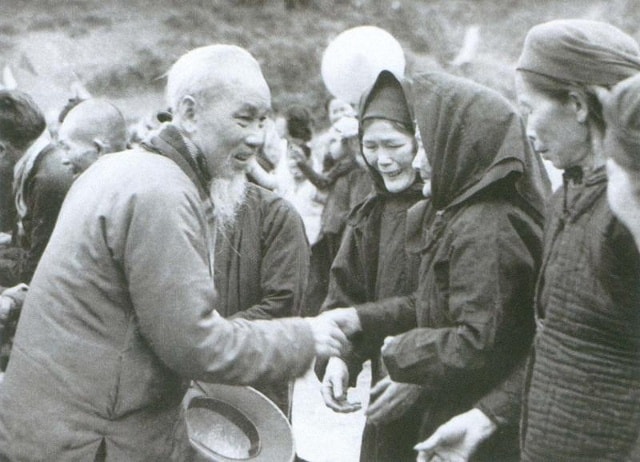 |
| Uncle Ho visited the people of Pac Bo, Cao Bang. |
That is why, right from the first days of the revolution, he always cared about the people's lives: if people were hungry, the Party and Government were at fault; if people were cold, the Party and Government were at fault; if people were sick, the Party and Government were at fault; if people were not educated, the Party and Government were at fault.
Immediately after the success of the August Revolution, he considered poverty as a dangerous enemy like ignorance or foreign invaders, so he soon launched a patriotic emulation campaign calling on all people to use many different methods and ways to help the people such as: increasing production, practicing thrift, sharing food and clothes, donating rice to relieve hunger...
During the long resistance war against French colonialism, he advocated increasing production, developing the economy, and both fighting and building the nation. At that time, he had the idea of eliminating hunger and reducing poverty. In the first meeting of the Government on September 3, 1945, he raised six urgent issues, of which famine relief was one of the six most urgent tasks. He said: The people are starving. More than two million of our compatriots have starved to death because of the cruel policies of the French and Japanese. Those who were about to starve to death are now also hungry. What must our Government do to keep them alive?
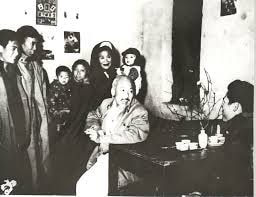 |
| New Year's Eve Uncle Ho came to the poor. |
The person who proposed the solution: I propose to the Government to launch a campaign to increase production, I propose to open a fundraiser. The saved rice will be pooled and distributed to the poor.
Therefore, hunger eradication and poverty reduction is the responsibility of the whole society. He called on all people to unite and promote the spirit of humanity, the traditional value of the nation "the whole leaves cover the torn leaves" to help people overcome hunger and poverty. When the government is in the hands of the people, we must make the people see the value of true freedom and equality, that is the true content of independence and freedom. According to him: "If the country has won independence and freedom but the people are still hungry, poor and miserable, then independence and freedom are useless."
He initiated, proposed and set an example in implementing the rice jar movement to relieve hunger, with the noble act of fasting one meal a week, along with the "Golden Week" movement. He mobilized the great strength of all compatriots into this meaningful movement to help the poor and build the country.
President Ho Chi Minh outlined the general mission of the revolution, including both socio-economic and cultural development, to help the working people escape poverty and have jobs, be well-off and live a happy life. These are very long-term and difficult tasks, because our material foundations are still lacking and weak, and we have to devote all our efforts to the struggle for independence and freedom, and we have to complete two tasks simultaneously: resistance and nation building, resistance to bring back precious things for the nation because "nothing is more precious than independence and freedom", and nation building to ensure the people's lives.
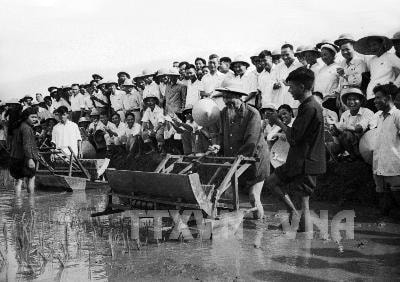 |
| President Ho is using a rice transplanter at the Rice Varieties Experiment Station of the Hanoi Department of Agriculture and Forestry. |
He considered the economy as the foundation for human development. It governs other areas, so he advised to build the economy first, because to improve people's lives, to develop people, there must be material conditions and premises. He called for: if we want socialism, there is no other way but to devote everyone's strength to production... All of us, regardless of level or sector, must contribute to the development of production.
President Ho Chi Minh was very concerned about the issue of economic development for ethnic minorities. He sympathized with and understood that ethnic minorities in mountainous areas, where the economic level was less developed, had to be helped by other ethnic groups with better conditions to escape poverty, guide them on how to make cases, help them organize production, eliminate superstition... so that ethnic minorities could rebuild a new life.
Right from the beginning of the country's founding and during the long resistance war against French colonialism, President Ho Chi Minh said: "When the French do not return, the Kinh people will have more free time to help the Tho and Man people more. The government will help the Tho and Man people like helping other small ethnic groups to have enough land to work and enough buffaloes to plow."
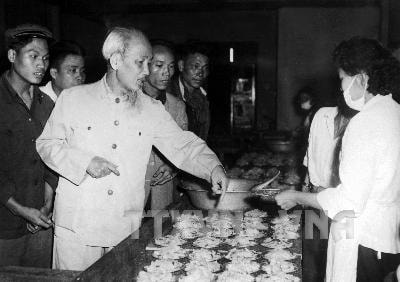 |
| President Ho Chi Minh visited the collective dining hall of workers at the rubber, soap and cigarette factory in Hanoi in January 1961. |
People often note that: Taking care of the lives of ethnic people is like defeating the enemy of poverty and backwardness. People instruct that we must promote increased production combined with savings, work more and spend less, work quickly and spend slowly, that is enough.
The new thing in his thought about hunger eradication and poverty reduction is that, along with increasing production, we must practice thrift, only then can we ensure the long-term success of hunger eradication. Up to now, this thought still holds its value. Currently, we have established a fund to eradicate hunger and reduce poverty, helping the poor by applying it to specific cases with a special segment of the population.
These are temporary humanitarian measures, but in the long term, we must guide them on how to do business, provide capital and technical assistance... so that they can rise up and escape poverty on their own. Giving them fishing rods and guiding them on how to fish is a long-term measure because only developing production can effectively eliminate hunger and reduce poverty. President Ho Chi Minh highly appreciated the strength of the people. He requested: using the people's talents and strength to liberate the people. According to him, eliminating hunger and reducing poverty is: "Making the poor have enough to eat, those who have enough to eat are quite rich, and the rich become richer."
So, every member of society constantly strives to overcome the barrier of poverty. He believes that the society we build is "rich people, strong country, fair, democratic, civilized society". It is far from poverty, backwardness, it is a society rich in economy, healthy in culture and society, this concept contains great significance in liberating productive forces, aiming at comprehensive human development.
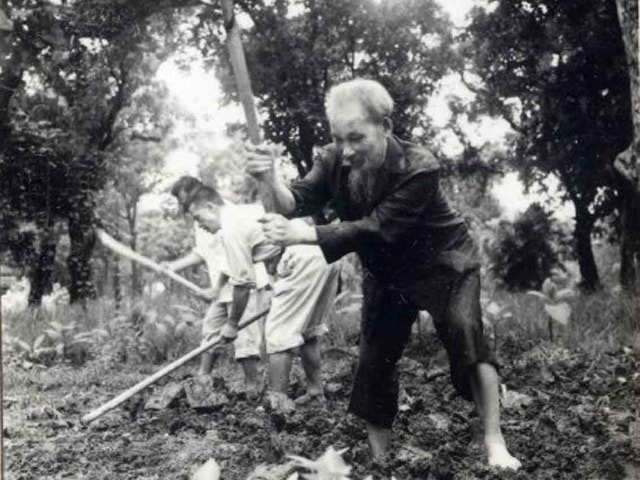 |
| Uncle Ho participated in labor and production. |
According to Him, an ignorant nation is also a weak nation, ignorance is also one of the three dangerous enemies that will hinder development. He pointed out that: having enough food and clothing must go hand in hand with progressive education, society must progress day by day, increasing material must go hand in hand with increasingly better spirit. Through that, we see that the profound meaning in His thought of poverty reduction is that in addition to eliminating material poverty, we must also pay attention to eliminating spiritual poverty, we should not be one-sided and only focus on the economy, but forget about spiritual culture, then there will appear dangers, dangerous obstacles that affect development.
This idea still clearly demonstrates its relevance today: Sustainable development must encompass both material and spiritual aspects. That is the great value in President Ho Chi Minh's thought on hunger eradication and poverty reduction that we need to apply creatively in the new situation, striving to achieve the common goal: Rich people, strong country, fair, democratic and civilized society.
Peace
(Synthetic)
| RELATED NEWS |
|---|


